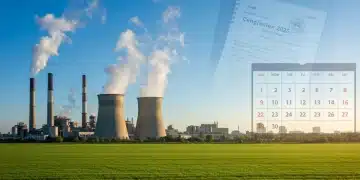Enjoy energy policy discussion for a sustainable future

Engaging communities in energy policy discussions ensures diverse voices are heard, leading to effective, sustainable solutions that reflect local needs and foster trust among stakeholders.
Enjoy energy policy discussion to dive into a world where sustainability and innovation meet. Curious about how policies shape our energy landscape? Let’s explore.
Understanding energy policies and their impact
Understanding energy policies is crucial for everyone. These guidelines shape how we use energy and its impacts on our lives and the environment. Energy policies influence not just regulations but also access to renewable resources, costs, and sustainability efforts.
The Basics of Energy Policies
At their core, energy policies are designed to manage production, distribution, and consumption of energy. They typically balance the demands for energy with considerations for the environment. Policies can vary greatly based on local needs and resources.
Key Components of Energy Policies
- Regulations: Rules that govern energy production and consumption.
- Incentives: Financial benefits to promote renewable energy use.
- Research and Development: Funding for innovative energy solutions.
- Public Awareness: Education initiatives to inform citizens about energy saving.
These components work together to create a comprehensive framework that addresses current energy challenges while paving the way for future developments. For instance, many regions are pushing for cleaner energies through government incentives.
The impact of these policies is far-reaching. They not only affect energy bills but also influence job creation in renewable sectors. As the demand for sustainable solutions grows, so does the importance of effective energy policies.
By promoting cleaner energy sources, communities see improvements in air quality and sustainability. This shift is increasingly important as climate change becomes a pressing issue. The role of policy in guiding this transition cannot be understated.
In summary, understanding how energy policies function helps us appreciate their significance. They shape our energy landscape, ensuring we can meet today’s needs while planning for a greener tomorrow.
The role of renewable energy in policy discussion
The role of renewable energy in policy discussions is becoming increasingly important. As the world combats climate change, these energy sources are at the forefront of conversations about sustainable practices. This shift in focus highlights how essential it is for various stakeholders to understand the benefits and challenges associated with renewable energy.
Importance of Renewable Energy
Firstly, renewable energy sources, such as solar and wind, help reduce greenhouse gas emissions. By utilizing these resources, governments can meet international climate commitments. Furthermore, transitioning to renewable energy creates jobs in emerging sectors, which can boost local economies.
Key Areas of Policy Impact
- Investment Incentives: Providing financial support for renewable projects.
- Regulations: Establishing standards for energy production to ensure quality and safety.
- Grid Integration: Improving infrastructure to support renewable energy sources.
- Public Engagement: Encouraging community discussions about energy choices.
In addition, these policies help integrate renewable energy into existing systems. By facilitating grid integration, communities can utilize clean energy more effectively. This makes energy systems not only more sustainable but also more reliable.
Developing clear energy policies that focus on renewables benefits both the economy and the environment. As we move forward, policy discussions will increasingly revolve around how to incorporate these energy sources into our daily lives.
Furthermore, educating the public about the advantages of renewable energy fosters greater support for these policies. When communities understand the potential benefits, they are more likely to support changes that promote sustainable energy practices.
How energy policies affect the economy

Energy policies play a significant role in shaping the economy. These policies can promote job creation, drive innovation, and influence energy prices. Understanding how energy policies impact economic factors is essential for communities and businesses alike.
Impact on Job Creation
Implementing strong energy policies often leads to job growth. When governments invest in renewable energy projects, they generate jobs in construction, manufacturing, and maintenance. This job creation stimulates local economies by supporting additional businesses and services.
Driving Innovation
Furthermore, energy policies can foster innovation. Regulations that encourage research and development lead to new technologies in energy efficiency and renewable energy sources. Companies are more likely to invest in innovative practices when they see support from government policies.
- Increased funding for clean energy initiatives.
- Encouragement for private sector investments.
- Support for education and training programs in energy fields.
As innovation grows in the energy sector, economic diversification can occur. This helps regions reduce their dependence on traditional energy sources that may be inconsistent or harmful to the environment.
The effects of energy policies also extend to consumer prices. Improved efficiency and increased competition can lower energy costs for households and businesses alike. When energy prices stabilize or decrease, everyone benefits, leading to a healthier economy. As people save on energy bills, they can spend more on other goods and services, further boosting economic activity.
Lastly, energy policies can influence investment trends. Investors are increasingly looking for sustainable opportunities, and strong policies can attract more investments in green technologies. This behavior can enhance local economic resilience and drive long-term growth.
Engaging communities in energy policy debates
Engaging communities in energy policy debates is crucial for creating effective and relevant policies. When local voices are heard, policies are more likely to reflect the needs and values of the community. This process helps everyone understand the importance of energy decisions.
The Importance of Community Engagement
Community engagement allows residents to express their opinions on energy policies that affect their lives. Public input can lead to better decision-making. Strong community involvement can also build trust between policymakers and citizens.
Methods to Foster Engagement
- Organizing public forums to discuss energy issues.
- Conducting surveys to gather opinions from residents.
- Creating informational campaigns about energy policies.
- Involving local leaders and advocates in discussions.
These methods invite diverse perspectives. By encouraging conversation, communities can discover common goals and solutions regarding energy use and sustainability. As individuals learn more about the impact of their energy choices, they become more motivated to participate in the policy-making process.
Moreover, utilizing technology can enhance engagement. Digital platforms such as social media can spread awareness and solicit feedback on energy issues. By promoting discussions online, more residents can participate, even if they cannot attend in-person events.
Ultimately, when communities engage in energy policy debates, it leads to a greater sense of ownership and responsibility. This involvement cultivates a culture of awareness around energy challenges and solutions, making policies more effective and sustainable.
Future trends in energy policy and sustainability
Future trends in energy policy are closely linked to sustainability efforts worldwide. As climate change becomes a major concern, policymakers are focusing on developing strategies that prioritize renewable energy sources. This shift aims to create cleaner and more sustainable energy systems that benefit both the environment and the economy.
Emerging Trends in Energy Policy
One significant trend is the transition to decentralized energy systems. These systems allow communities to generate, use, and manage their own energy resources locally. By adopting decentralized models, communities can reduce reliance on fossil fuels and enhance energy security.
Investment in Renewable Technologies
Another important trend is increased investment in innovative renewable technologies. Governments and private sector partners are funding advancements in solar, wind, and geothermal energy. These investments aim to improve energy efficiency and lower costs for consumers.
- Enhancing battery storage solutions for renewable energy.
- Developing smart grids to optimize energy distribution.
- Encouraging electric vehicle integration into energy systems.
Furthermore, there is a growing emphasis on policies that promote energy efficiency. Governments are implementing stricter regulations on energy consumption in buildings and industries. By setting higher efficiency standards, they aim to reduce waste and greenhouse gas emissions.
Consumer awareness and action are also critical in shaping future energy policies. As more people demand sustainable practices, businesses and local governments must respond. This pressure will likely lead to more effective and innovative policies that prioritize environmental protection.
Finally, international cooperation is essential for advancing sustainability in energy policy. Countries must work together to share knowledge and resources. Collaborating on global initiatives can help address energy challenges and achieve sustainability goals more effectively.
FAQ – Frequently Asked Questions about Energy Policies and Sustainability
Why is community engagement important in energy policy?
Community engagement ensures that diverse voices are heard, leading to policies that better reflect the needs and values of the people.
What are the key trends in energy policy for sustainability?
Key trends include a focus on renewable energy, investment in innovative technologies, and fostering international cooperation.
How can innovation impact energy policy?
Innovation can lead to new technologies that improve energy efficiency and sustainability, driving better policies and practices.
What role does international cooperation play in energy policy?
International cooperation is essential for addressing global energy challenges and sharing successful strategies for sustainability.





